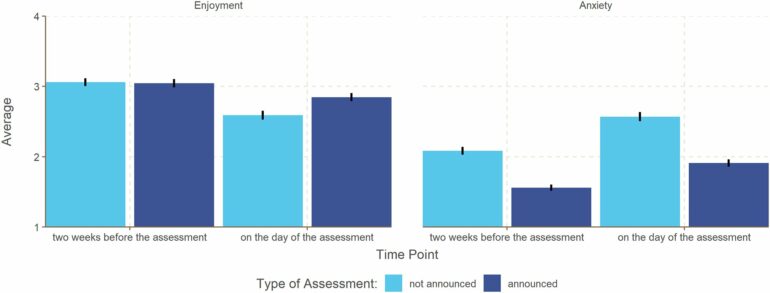To this day, there is a debate about whether performance tests in schools ought to be announced. A new study conducted under the direction of Prof. em. Dr. Ludwig Haag (University of Bayreuth) and Prof. Dr. Thomas Götz (University of Vienna) has come to the conclusion that the practice of not announcing performance assessments increases students’ anxiety, reduces their enjoyment of learning, and thus weakens their performance. In contrast, reliable announcement of performance assessments has positive emotional effects and can improve learning performance. The researchers published their study in the journal PLOS ONE.
“In Germany, most states have now legislated for all types of schools that written performance tests of any kind must be announced. Our findings clearly show that this is progress that should not be underestimated,” said Prof. em. Dr. Ludwig Haag, expert of school pedagogy at the University of Bayreuth. However, in school practice, reasons have been cited to date in favor of unannounced performance assessments.
In particular, it is argued that steady attention in class and continuous learning progress would be promoted if students could be given tests and grades based on them at any time.
“In our study, we started from an opposite hypothesis: Reliably announced performance assessments strengthen students’ ability to consciously assess and self-monitor their own performance. Therefore, they have a more beneficial effect on students’ emotions and learning outcomes compared to unannounced performance tests. The results of our empirical study confirm this assumption,” explains Haag.
A total of 414 students from 19 middle and high school courses participated in the study. For one school year, emotion-related data were collected and correlated with the students’ performance on announced and unannounced performance assessments.
The focus was on anxiety and enjoyment that occurred in relation to these tests. In the run-up to and during announced performance tests, students felt significantly more enjoyment and less anxiety. In the case of anxiety, this difference from the unannounced performance tests was already observable two weeks before the respective date.
Moreover, joy and anxiety were clearly linked to test scores and grades: The less learning was accompanied by anxiety and the more joy students experienced while learning, the better grades they were able to achieve.
Overall, the study provides ample valid evidence that not announcing performance assessments—as compared to announcing them—can adversely affect student performance. The authors argue that these findings should be given greater attention and use in education and pedagogy.
“Teachers in schools today are often faced with a choice between different goals: While unannounced tests seem to promote continuous learning, announced tests reinforce emotional balance and intrinsic enjoyment of learning. In terms of the learning outcomes achieved, our study clearly argues for giving more weight to students’ emotions in education: fear is not a good teacher—that’s actually an old insight,” says Prof. em. Dr. Ludwig Haag.
More information:
Maik Bieleke et al, The agonizing effects of uncertainty: Effects of announced vs. unannounced performance assessments on emotions and achievement, PLOS ONE (2022). DOI: 10.1371/journal.pone.0272443
Provided by
Bayreuth University
Citation:
New study on school pedagogy: Announcements of performance tests promote learning success (2022, November 21)



